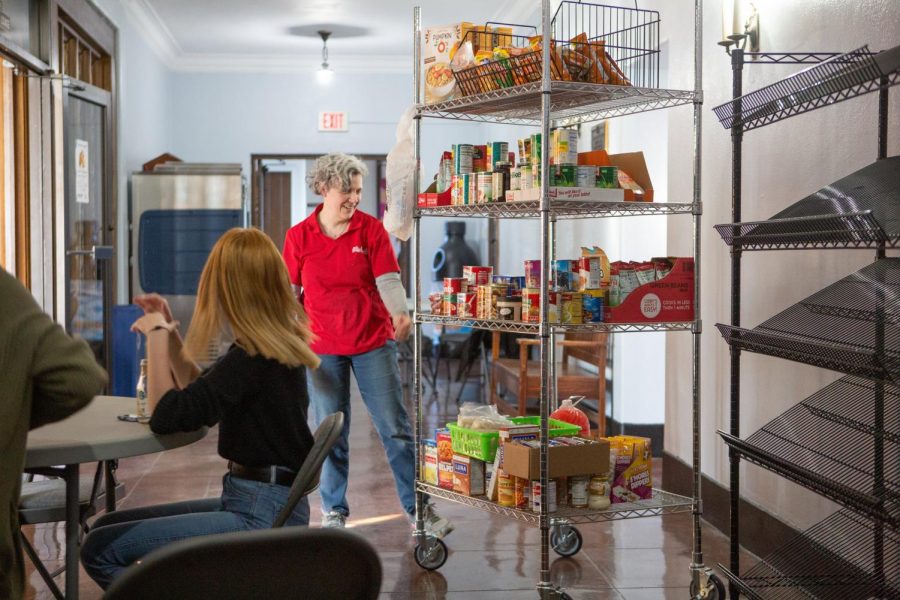Food banks continue to be overwhelmed, search for student volunteers
Food Pantry Director Dawn Longfellow wheels a rack of food at a food pantry in the Champaign area on Feb. 21, 2020. Food banks are looking for student volunteers to help out.
Aug 4, 2021
After much debate circulating in Congress, a decisive move has been made.
On Aug. 3, the Centers for Disease Control and Prevention issued a new federal eviction moratorium. The new eviction ban will last for 60 days, until Oct. 3. It covers areas of the country experiencing high levels of coronavirus infections, which has made a catastrophic resurgence in the last two weeks.
The CDC’s original eviction ban, which had been in effect since September of last year, expired on July 31 to much scrutiny by the millions of people in the firing line of eviction. While this is good for many, the struggle is hardly over.
2020 was dominated by hardship that affected nearly all corners of the United States. Images of food banks facing lines of cars stretching entire parking lots and millions became unemployed and struggled to get pay.
While much progress has been made since the lows of mid-2020, the financial crisis still lingers for many.
Get The Daily Illini in your inbox!
Bringing the picture back down to the residents of Champaign and Urbana, the courageous and admirable work of local groups tasked with addressing the crisis cannot be ignored.
While the days of everyone getting outside and clapping for health care workers seems to be an Instagram trend of the past, admiration can still be shared for the local community members at the Eastern Illinois Foodbank. More importantly, rather than emojis and Facebook posts, you can show your appreciation for such by taking up volunteering opportunities at the food bank today.
The Eastern Illinois Foodbank is an organization that exists to alleviate hunger in eastern Illinois. They do this by providing a dependable source of food for those facing food insecurity’s through working with a network of partner agencies and food pantries.
Merry Mitchell, Community Relations associate of the organization, spoke about the goal of the group extensively.
“We’re the primary source of food for these organizations, and we get this food by either purchasing it or donations,” Mitchell said. “We then distribute it across our network of over 170 partner agencies. By partnering with EIF, these agencies are able to save millions of dollars in costs associated with food purchase and handling.”
The food bank is located at 2405 N. Shore Drive in Urbana, Illinois. For the fiscal year of 2020, it proudly boasts having 53,000 people served monthly by member agencies, 11.5 Million pounds of food distributed and 2.5 Million pounds of nutritious produce distributed in our 18 counties.
While it has many members, Mitchell emphasized the agency is more than happy to accept volunteer work from students. She said it’s simple to sign up and get to work, and a great opportunity to give back to the greater community.
“We do have a volunteer newsletter that comes out once a month that lists any new EIF volunteer opportunities,” Mitchell said. “This newsletter also provides the signups for these events. To subscribe, please go to our website and scroll to the bottom of the page to fill out the form.”
Alas, the pandemic has not left the organization unaffected, but Mithcell emphasized that while changes had to be made, the duty had to be fulfilled nonetheless.
“Because of the pandemic, we have limited volunteering opportunities but currently are doing two repack events a month,” Mitchell said. “The purpose of a repack is to take bulk product that we purchase (large containers of dried foods like rice or pasta, or even cans of food) and package them into smaller containers to be delivered to our partner agencies, which then is distributed to those who need it.”
The team is also looking for translators that are willing to travel to the Foodmobile sites to assist anyone who might need help. Foodmobiles are mobile food pantries focused on alleviating hunger in rural and underserved communities.
“We also need volunteers to help with data entry at these Foodmobile sites,” Mitchell said. “EIF uses Link2Feed, a program that helps us collect data about those who benefit from our services in order to have accurate data detailing who is impacted by food insecurity. Having this information leads to informed decisions on how to best serve those facing food insecurity.”
With the move back to campus closely approaching, Mitchell said she urges students to consider helping out. Foodbanks are still overwhelmed and need help.






